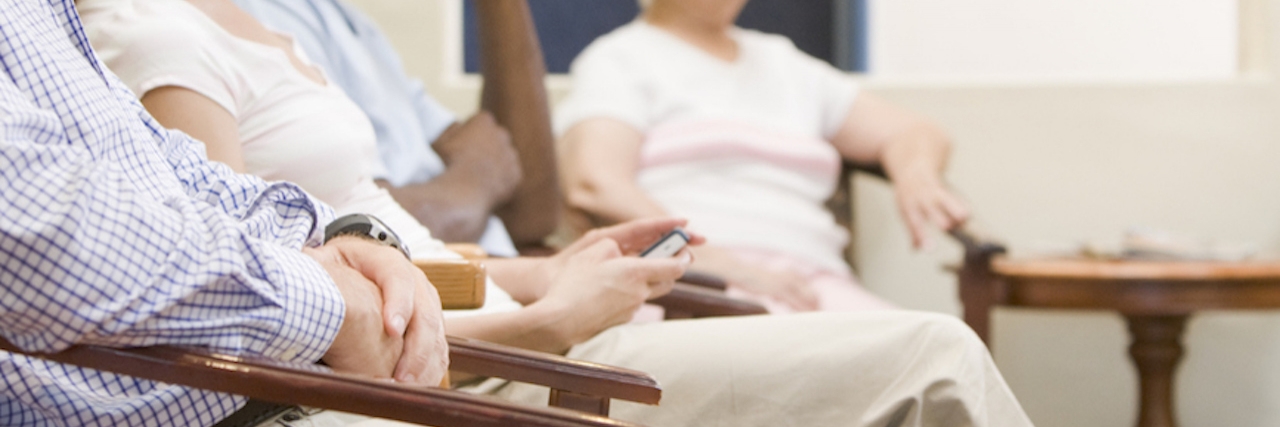When People in a Waiting Room Changed My Image of Cancer Patients
I am sitting in my gynecologist’s office lobby, right leg nervously shaking, eyes never leaving the design on the floor. A few days earlier, a CT scan showed a mass on my uterus. I had the report sitting in a white envelope next to me. The radiologist stated on the report something in doctor language that basically translated to “Get your a** to your OB-GYN and get screened for cancer.”
As I waited to be called back by a nurse to hear my fate, my ears picked up a conversation a few chairs down from me. “Yeah, I just had a double mastectomy, Stage 3 cancer.” The words are pouring out of the mouth of a woman who looks to be my age, early 30s. “I go back for another surgery in January.”
She is speaking to a man sitting in a row of chairs across from her. He is what I would describe as Mr. Clean tatted up, wearing an Ed Hardy shirt with muscles bulging through. “Yep,” he says back to her, nodding his head. “Actually had that myself a few years back. I was the first male in my family to get it. Kicked my a**, but I survived, and so will you.” Now at this point, I am looking at these two otherwise healthy looking people, young, in the prime of their lives, and all I can think is, What the hell is going on?
Their conversation continues. I find out the woman with breast cancer has two kids — so do I. Soon a nurse calls the woman whose name I don’t know, yet whose personal story I am now so connected to. She walks past me. I see her shirt: “F*ck Cancer” with a pink ribbon where the “u” would otherwise be. I smile.
I remember my first encounter with cancer. I was around 7 or 8 years old when my grandparents took my family out to dinner. After what seemed to be a typical night out at a restaurant with Nana and Poppop, a bomb was dropped. My grandfather had cancer and six months to live.
I won’t go into detail about how my Nana was not going to take a six-month death sentence from someone in a white coat, or all of the miraculous things she did to ensure he lived on this earth for nine more years. I saw what cancer can do to someone.
I saw how my once tall and intimidating grandfather became weak, lying in a bed being waited on by hospice nurses. My next encounter with cancer came a few years later with my Nana, who had pancreatic cancer. She was 81.
My point is while cancer is a horrible, horrific disease, it was my grandparent’s disease, not mine.
I’m still in the waiting room at my gynecologist’s office — stomach churning, palms sweating, feeling like time has stopped. Out of the blue, I hear my name. I jump up and rush back, as if they will close the door in my face if I don’t show urgency.
I get undressed and sit on the examining table, waiting for a white coat to walk in. I think about the history I have with this office. Coming in pregnant for the first time, walking out crying after not finding a heartbeat. Bringing my daughter in as a newborn after several years of trying to conceive to show the doctor the miracle she had delivered. Three months later walking back in pregnant again, finding out in that same office it would be a boy, and bringing him in as a newborn as well.
I think to myself, if it is cancer, how many more times will I walk into this building?
Thankfully, it wasn’t. That is the present, and that is a present.
I’m lucky. It was a two-month ordeal of tests, ultrasounds, blood work and a hellish emergency room story for another time to find out that it was simply a large abscess on my fallopian tube.
However, that is a walk in the park, a blink of an eye, compared to what cancer patients go through — and the truth is, patients seem to be getting younger and younger.
During the two months when I thought my life might hang in the balance, a close friend from high school lost her husband to leukemia. He was 33. She is now a widow with two children, and she is my age. An acquaintance from my child’s preschool kept asking for prayers for her 24-year-old friend who had cancer. The 24-year-old also passed. At least 10 people within my social circle got treated, diagnosed, passed or were living with cancer during those two months of uncertainty in my life. All of those people are under the age of 40.
According to the National Cancer Institute, an estimated 69,212 adolescents and young adults (ages 15-39) were diagnosed with cancer in 2011.
That was five years ago. I wonder what the numbers are today? From where I am sitting, it seems a lot higher than that. From where the woman in the “F*ck Cancer” shirt with two small children is sitting, I would imagine it seems higher than that. I know from where all of my friends affected by cancer who are in their 20s and 30s are sitting, it seems higher than that.
Stand up to cancer? Perhaps. Or maybe it’s time we do more than stand up. Maybe it’s time we kicked cancer on its a**. F*ck cancer. It’s not just your grandparent’s disease.
The Mighty, in partnership with Fuck Cancer, is asking the following: What do you wish you had found on Google when you were first diagnosed? Find out how to email us a story submission here.
Lead photo source: Thinkstock Images

